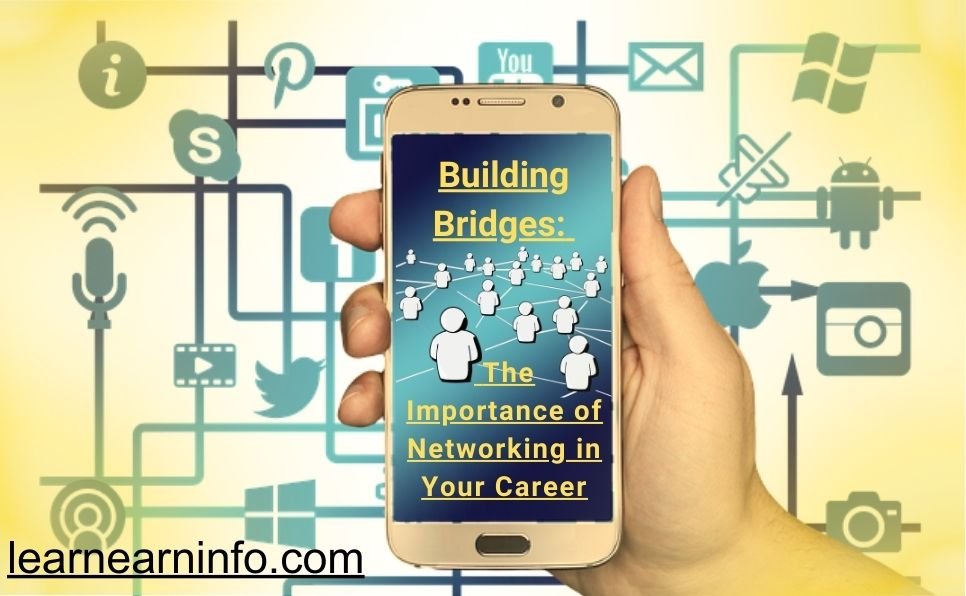Table of Contents
- Introduction
- Why is Networking Important?
- Types of Networking
– Personal Networking
– Professional Networking
- How to Build Your Network
– Attend Events
– Use Social Media
– Volunteer
- Benefits of Networking
- Networking Tips for Success
- Common Networking Mistakes to Avoid
- Key Takeaways
- FAQs
Introduction
**Networking** is like building bridges. Imagine observing opportunities from one side of a river while standing on the opposite bank. Without bridges, getting across would be impossible. In your career, networking is that bridge to opportunities, growth, and success. It’s about forming connections that can help you and others succeed.
Why is Networking Important?
Networking is crucial because it opens doors to new opportunities, helps you learn from others, and allows you to share your own experiences. It’s important to consider who knows you in addition to who you know.
Your network is what makes you valuable.” — Porter Gale
**Networking** enables you to discover possible mentors, obtain fresh perspectives, and remain up to date on industry trends. It also provides a platform to showcase your skills and achievements, making it easier for others to recognize your value.
Types of Networking
Personal Networking
Personal networking involves connecting with friends, family, and acquaintances. These relationships often provide emotional support and can lead to unexpected career opportunities. For example, a friend might introduce you to someone in your desired field or alert you to a job opening.
Professional Networking
Professional networking focuses on connecting with colleagues, industry peers, and mentors. This type of networking is essential for career growth and learning. Engaging with professionals in your field helps you stay updated on industry developments and best practices.
How to Build Your Network
Attend Events
Attending industry conferences, workshops, and seminars is a great way to meet people with similar interests and goals. These events provide opportunities to learn from experts, participate in discussions, and make new connections.
- **Industry Conferences**: Attend conferences relevant to your field to meet thought leaders and peers.
- **Workshops**: Participate in workshops to gain hands-on experience and network with attendees.
- **Seminars**: Join seminars to stay informed about the latest industry trends and network with professionals.
Use Social Media
Platforms like LinkedIn are perfect for professional networking. Make connections with people in your field, interact with their material, and offer your own perspectives.
- **LinkedIn**: Create a professional profile, connect with industry peers, and participate in groups and discussions.
- **Twitter**: Follow industry leaders, join conversations, and share relevant content.
- **Facebook**: Join professional groups and engage with members to expand your network.
Volunteer
Volunteering for events or causes related to your field can help you meet new people and showcase your skills. It also demonstrates your commitment and willingness to assist.
- **Professional Organizations**: Volunteer for roles in industry associations to meet like-minded professionals.
- **Community Events**: Participate in local events to connect with people in your area.
- **Nonprofit Organizations**: Offer your time to causes that are in line with your beliefs and areas of interest.
Benefits of Networking
– **Opportunities**: Networking helps you find job openings, career advancements, and collaborations.
– **Knowledge**: Learn new skills, industry insights, and best practices from your network.
– **Support**: Consult peers and experts for guidance, inspiration, and mentorship.
Networking Tips for Success
- **Be Sincere**: Take a sincere interest in other people and their endeavors.
- **Follow Up**: Always follow up after meeting someone new to maintain the connection.
- **Offer Help**: Offer your assistance before asking for favors. It builds trust and goodwill.
Common Networking Mistakes to Avoid
- **Being Too Aggressive**: Don’t push your agenda too hard. Networking is about building relationships.
- **Neglecting to Follow Up**: Always reconnect after initial meetings to keep the relationship alive.
- **Not Listening**: Pay attention to what others say and show genuine interest in their stories.
Key Takeaways
– **Networking is Essential**: It is crucial for career growth and opportunities.
– **Build Personal and Professional Networks**: Both types of networks are important for different reasons.
– **Use Multiple Strategies**: Attend events, use social media, and volunteer to expand your network.
– **Be Genuine and Helpful**: Show genuine interest in others and offer help to build strong relationships.
FAQs
**Q: What is the best way to start networking if I’m shy? **
A: Start small by connecting with people you already know and gradually attend events to meet new people. You can also use online platforms to build confidence before meeting in person.
**Q: How often should I follow up with my network? **
A: Follow up after initial meetings and stay in touch periodically to maintain the relationship. Regular check-ins, such as once every few months, can help keep the connection strong.
**Q: Can social media really help with networking? **
A: Yes, platforms like LinkedIn are excellent for connecting with industry professionals and staying updated on trends. Engaging with content and joining groups can expand your network and visibility.













































